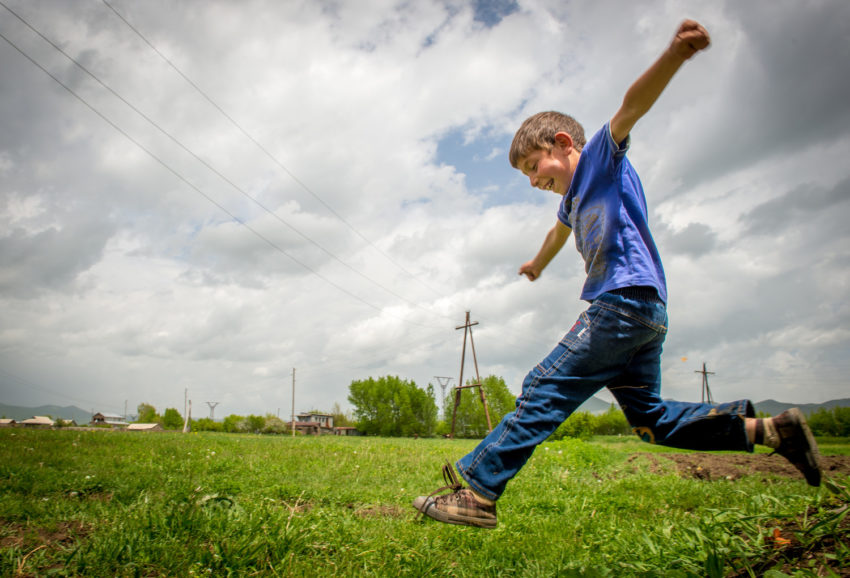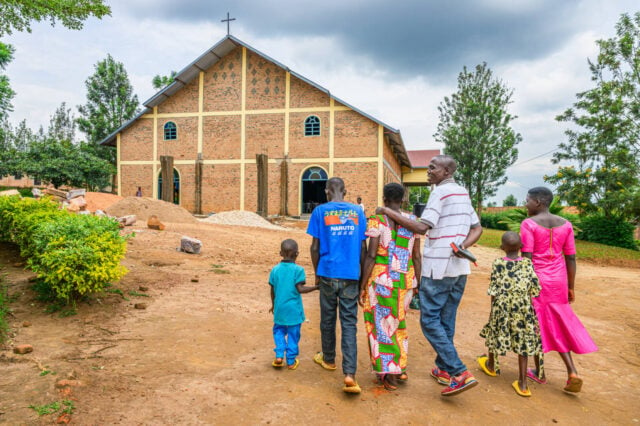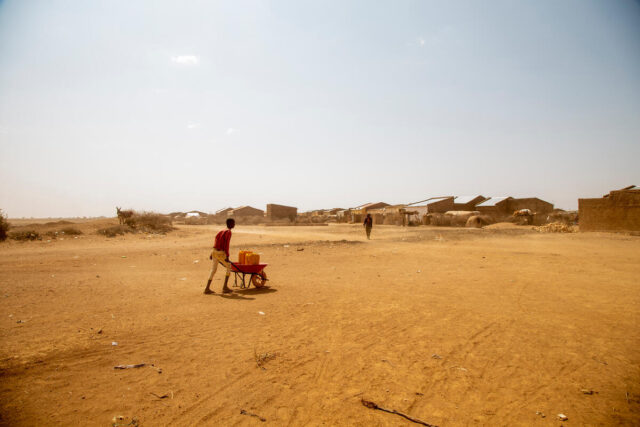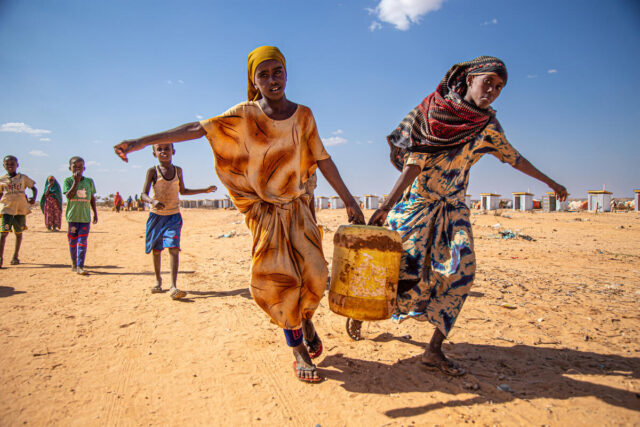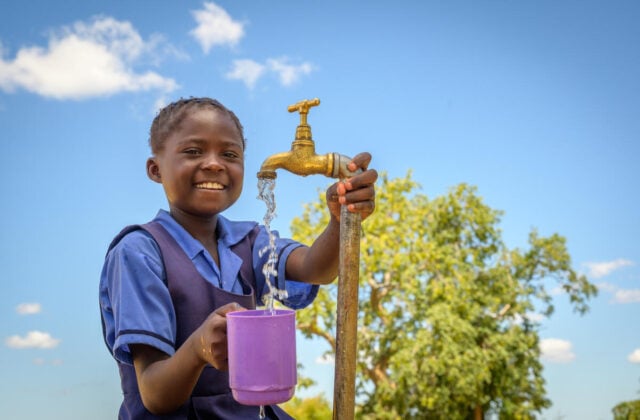After decades of suppression under communism, Armenia, the world’s first Christian nation, is returning to its roots. The generation of believers leads the way, finding new faith in Christ — and in each other.
Up four flights of crumbling steps, past laundry drying in the dim stairwell, 13-year-old Menua* (*Last name omitted to protect identity.) and his mother survive in a leaky rooftop apartment that was built for storage.
His father died when Menua was 4. But that’s not the worst of it. Now the young man is losing his sight.
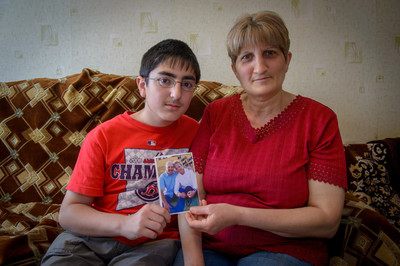
No one could blame Menua for resenting the life that is his in Armenia’s northwestern city of Gyumri. But he holds no grudges. Instead, the quiet teenager confidently points to what he calls his “holy corner,” a small shelf where he keeps coveted reminders of his faith in Christ — a cross, small pictures of Jesus, and religious symbols in the Armenian church.
This is where he prays. And Menua prays a lot — for his mother, for his eyesight, and for his dedicated U.S. sponsors, Rick and Rebecca Torossian, who funded surgery to improve his vision.
Rick, who is of Armenian descent, says the couple sponsored Menua because the boy was growing up without his father. Menua and the Torossians write to each other often, so when the couple heard Menua needed surgery, they were happy to help pay for the procedure. World Vision social workers visit Menua to make sure he has the basics, such as clothing, food, education, and Christian activities.
The Torossians also send an extra amount to Menua for his birthday, which Menua and his mother usually use to buy food.“To think that a birthday present is food is humbling beyond words,” Rebecca says.
“To think that a birthday present is food is humbling beyond words,” Rebecca says.
I keep my eyes on God. He is my leader.—Menua, 13
Although the surgery didn’t succeed, Menua has faith beyond his years. He prays his sight will somehow improve. If not, he will continue to steadfastly cling to a different kind of vision: “I keep my eyes on God. He is my leader.”
Nurturing the faith of young people like Menua is a priority for the Armenian Apostolic Church, which seeks to rekindle Christianity after it was nearly snuffed out under communist oppression. The church has a strong partner in World Vision, active in Armenia since 1988.
Their vibrant, long-term partnership equips church leaders to serve struggling families, encourages young people to care for those in need, provides clubs and summer camps for the most vulnerable children, and supplies a widely used curriculum that teaches children how to live by faith in Christ.
“Seventy years of communism’s unbelief set the church back 1,700 years to the beginning of faith in Armenia,” says Father Nerses Sahakyan, who serves in Gavar, a collection of remote towns in east central Armenia. “The Apostolic church alone can’t solve all the problems. But the church, working with World Vision, is stronger in serving the community. We’re walking forward together with big steps.”
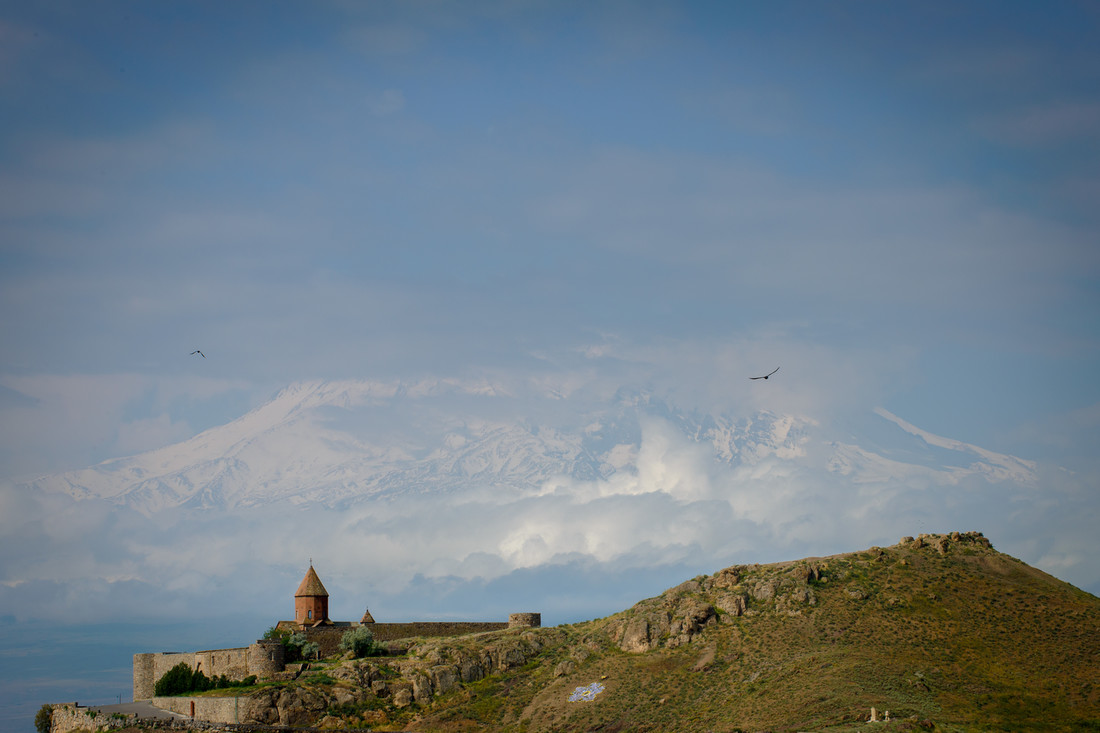
Communist Armenia: Faith in exile
Throughout Armenia, rock is everywhere. Boulders spew from rolling hillsides. Stonewalled homes, churches, and office buildings fill the nation’s cities and towns. For many, including Menua, life can be as unyielding as stone, a hardscrabble existence that has come to define the aftermath of seven decades under communist rule. If Menua had been born a few decades earlier, even his private prayer corner would have been banned. When the Soviet Union absorbed a war-weary Armenia in 1921, the new government sent thousands of priests into exile in Siberia. Hundreds of them were killed.
Armenia’s ancient church doors slammed shut, except for the sanctuaries converted to serve as government buildings, music halls, even barns. Atheism was strictly enforced at the hands of the KGB.
Talking about anything related to faith just wasn’t allowed.—Father Nshan Panfyorov
Father Nshan Panfyorov, who heads Christian education in Gyumri and the surrounding Shirak Diocese, recalls an assignment in his communist grade school. A teacher asked the students to form words from a list of partial words. The young Nshan put together “con” and “fession” — and quickly found the principal interrogating him about how he knew the word “confession.” The principal also called his parents into the office, threatening to have them fired from their Soviet-controlled jobs.
“Talking about anything related to faith just wasn’t allowed,” Father Nshan says. “If you did, you would be shamed by the Soviet government — or even lose your job.”
Three generations passed without access to Christian community, education, or sacred gathering places. The government banned Bibles and Christian teaching. Slowly, the once fervent faith faded. Yet in this resolute nation between the Black and Caspian seas, threads of faith remained, however frayed.
Communism’s fall in the early 1990s created as many challenges as it solved. For most of the 20th century, Armenians worked in Soviet factories and were thankful to have jobs. But when the Soviet Union collapsed, the factories closed. Hundreds of thousands were left without a source of income. Meanwhile, a conflict with neighboring Azerbaijan erupted, ushering in “the dark years,” four years when life’s basics — food, water, electricity, and medical care — were scarce.
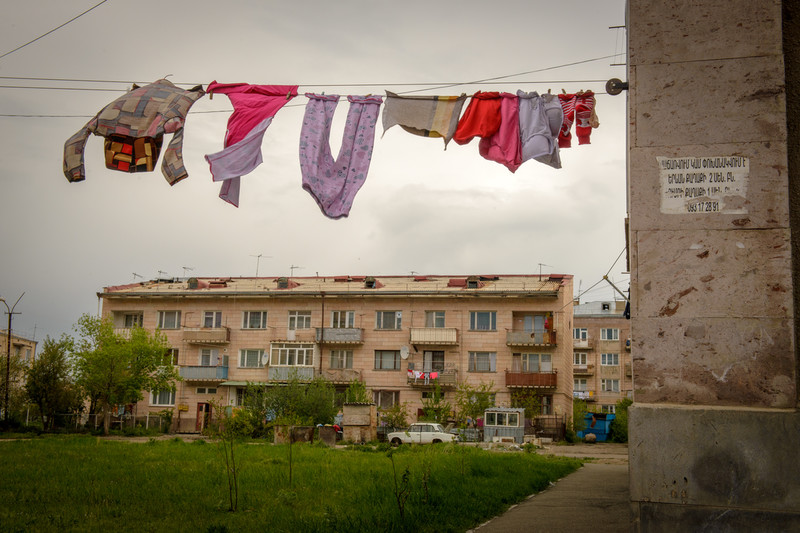
As the nation plunged into turmoil and unemployment soared, desperate fathers and older sons moved north to Russia in search of work, a migration that continues today. Empty stone houses with missing doors and windows dot the countryside, a testimony to the desperate lack of job opportunities.
In rural areas, nearly every family has lost males to jobs in Russia. Many fathers return regularly or at least send money back to their families. But some are never heard from again. Without fathers at home, families often are left in dire need. Mothers care for the children with few resources — and faith frequently takes a back seat to survival.
“More people are leaving for Russia than even in the dark years,” says Father Nshan. “This says something about the condition of hope here.”
Restoring Christian community for the Armenian people
When the Soviet Union collapsed in 1991, World Vision was already in Armenia, stabilizing families following the 1988 earthquake that severely damaged Gyumri, the nation’s second largest city. In response to dire poverty in post-communist Armenia, World Vision’s emergency response work expanded in the mid-1990s to include child sponsorship. World Vision and the beleaguered Armenian Apostolic Church also joined forces to rekindle the faith in Christ that was doused under communist oppression.
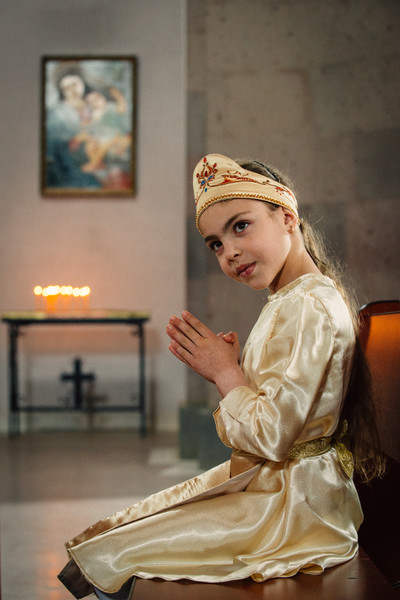
In the mid to late 1990s, waves of young priests emerged from seminary, anxious to restore the Apostolic church in ways that go beyond the confines of the ancient churches and monasteries.
Among these devoted ministers is Father Paren Petrosyan, an energetic 31-year-old who is living his childhood dream of becoming a priest. One day the cleric, who is married like many priests in the Apostolic church, is at World Vision’s office in Gyumri, where women have gathered to soak up biblical wisdom on marriage and family life. The next day he is miles away in Marmashen village, walking house to house, assisting families in need. Just about every household in the community is in need of his encouragement and guidance.
Father Paren participated in World Vision’s Celebrating Families program, an intense training that equips priests to live out their ministry as Jesus did — among the people. He covers 11 villages — more than 1,000 people total — and tries to visit each home every few weeks. He also teaches Sunday school and leads youth clubs.
Then there are liturgies, baptisms, weddings, funerals, and church events. The priest admits he gets tired. When he does, he reminds himself of his calling to serve others.
“Each moment that I’m delegated to go, it’s not me who’s going. It’s God,” he says.
On this day, Father Paren arrives at the weathered home of a family whose mother and older brother are working in Russia. They send home what amounts to about $100 a month.
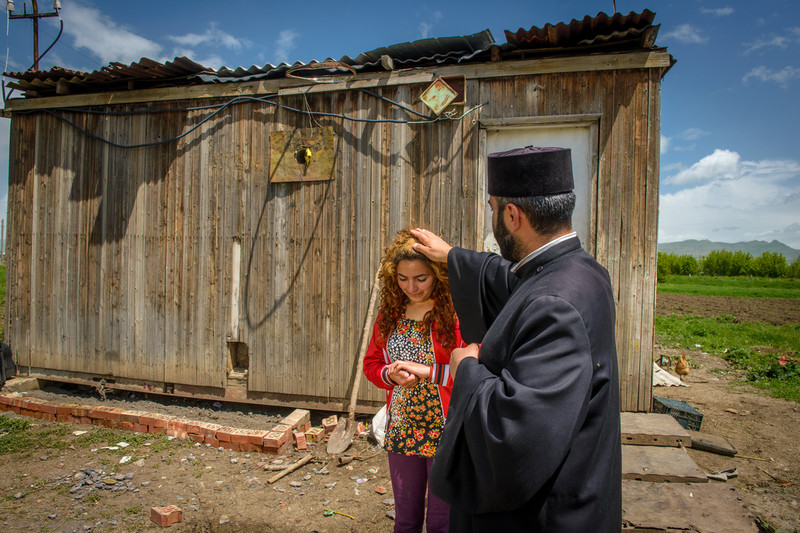
The oldest sister, 22-year-old Geghetsik, is a confident stand-in for her mother. A few years ago, when she was a sponsored child, World Vision provided Geghetsik with training to become a hairdresser, a skill she now uses to earn income.
“I mainly do hair for friends in the community,” Geghetsik says. “They pay a small amount of money for this, but it helps.”
Three younger children are still sponsored. They participate in World Vision summer camp and Christmas and Easter celebrations. The family relies on a cow, a calf, 30 hens, and two roosters to keep food on the table — all provided by generous U.S. donors.
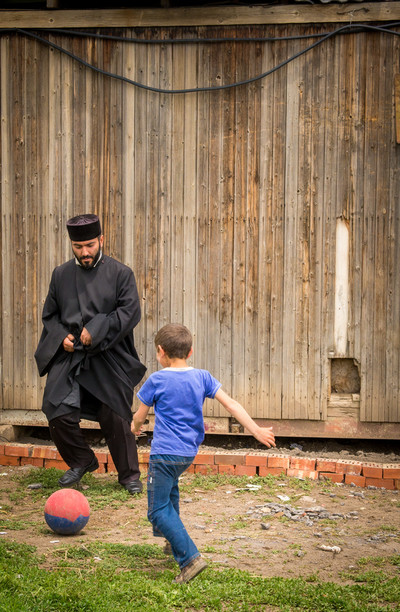
Seven people live in the family’s tiny house, crowding into three beds in one small room. A single light bulb dangles from a blackened bedroom ceiling, the rustic wood floor rests uncertainly on dirt, and one dusty window lets in weak light. The house has no water — except when the rain leaks through the sagging roof. The family has lived like this for more than 18 years.
As Father Paren approaches, the children step forward for his blessing. They are happy to see him, and the priest listens to the children to discern if they have issues at home or school that he can help them address.
“When families don’t have enough for a stable life, parents often don’t want to be a part of society,” he explains. “In many cases, the children don’t want to go to school because they don’t have normal clothes and are ashamed. But the parents are doing the best they can.”
Here, he says, is one place where World Vision’s presence is especially critical, providing essentials like school supplies, games, and transportation to events so vulnerable children can just be children.
As the conversation between priest and children concludes, it’s time to play. Father Paren lifts his cassock to his knees and kicks a ball with 9-year-old Vahag. Their delight rings out across the pastureland — another reminder of God’s presence in this isolated community.
Miracle in the making
Following the 1998 Gyumri earthquake that claimed at least 25,000 lives, thousands of homeless families moved into government-supplied shipping containers that had little insulation to ward off Armenia’s bitter winters. Nearly 4,000 people still live in these containers because, more than 25 years after the temblor, there still isn’t enough affordable housing for all displaced families.
While the government couldn’t come up with a solution for these families, faith-fueled youth have. Working jointly with World Vision and the Apostolic church, Gyumri’s youth are raising the funds to purchase basic condominiums at no cost to desperate families.
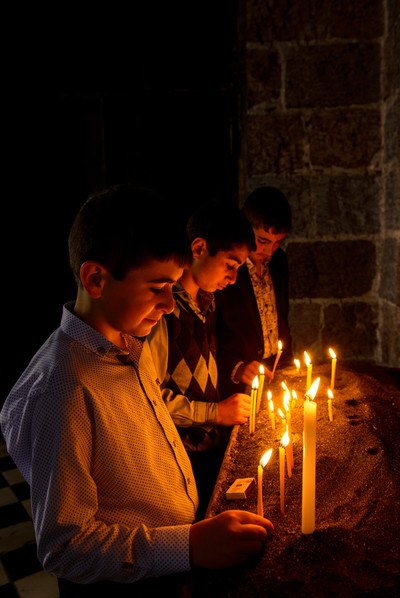
The 50 youth, ages 15 to 24, comprise a group known as the Charitable Union, which was founded at Gyumri’s Seven Wounds Church. Some of the 35 females and 15 males live in poverty themselves. Even so, when the youth saw the dire needs of families still living in shipping containers, they decided in 2013 to launch an effort some called crazy.
They found a Christian businessman willing to fund the cost of producing custom pocket calendars. Then the youth went to work, scouring the Gyumri region for individuals willing to pay $1 in exchange for a pocket calendar. The goal of the project — christened “One Card = One Home” — was to raise $15,000 to buy a condominium for a family.
Gor Torosyan, who at 26 leads the Charitable Union and the One Card = One Home campaign, is relentless in his dedication to helping families in poverty. “Faith to us Armenians is something sacred,” he says. “Based in the values we receive through faith, we have the wish, the desire to make positive changes.”
World Vision works alongside these young Christian men and women, encouraging their vision, training them in leadership skills and project management, teaching them how to network, and helping to spread the word about their project across the country.
With newly acquired savvy, initiative, and even some television coverage, the youth raised more than $15,000 one dollar at a time — and even had extra funding for the next condominium they would give away. They screened each family that applied for the first home, selecting the final family by lottery.
Soon the youth were collecting funds to purchase a second home, but this time without a lottery. Instead, the youth pre-selected an extremely destitute family of four to receive the next condominium. This family lived in a 20-foot metal shipping container without even a bathroom. Family members bathed in a tub near a small stove.
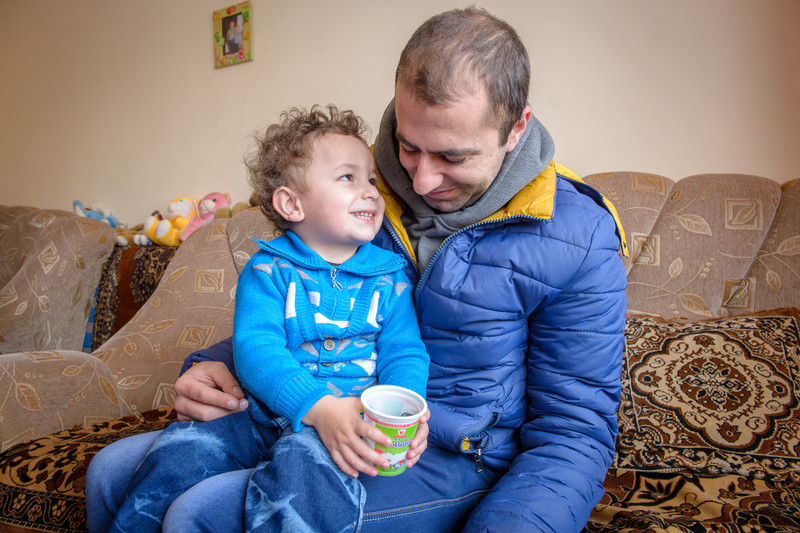
In Armenia, when loved ones are about to bathe, family members often say “Have a sweet bath.” But the family’s 5-year-old son objected to this tradition when he took a bath in his shipping container home. “It isn’t a real bath,” Hayk would insist.
The stove was the only source of heat for the uninsulated container, and the family burned anything they could find to stay warm — paper, cardboard, even old clothes people gave them. After Hayk and 3-year-old Arman were born, life became even more challenging in the tight quarters, with the toddlers burning themselves on the stove. The area surrounding the container also was unsafe, filled with garbage and debris.
Artyom, Hayk’s father, moved into the container following the 1988 earthquake, when few houses were left standing. Tehmine joined him there in 1994, after the couple married.
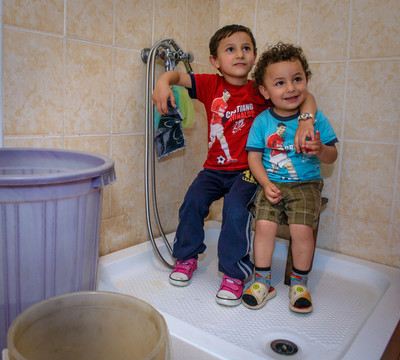
Nearly two decades later, the couple could see no way out. Artyom wanted to work but has a disability. Tehmine used to work as a kindergarten teacher until the school closed. She now stays home to care for her children and husband.
All her life, Tehmine dreamed of having a house with a living room, kitchen, and bathroom. So when representatives from Charitable Union arrived last December with the keys to the family’s new condo, Tehmine was overwhelmed by this gift of a home without a mortgage — and more than she ever dreamed she’d have, with a bedroom and a balcony.
“I’ve always believed in miracles,” Tehmine says, “and I know this is from God. I can’t thank God, the young people, and World Vision enough.”
Hayk, now sponsored, smiles when his mother tells him to have a sweet bath. His brother, Arman, is waiting for a sponsor. Artyom is looking forward to the possibility of surgery when the family can afford it. This would allow him to return to work.
Now the Charitable Union youth are raising funds to purchase yet another home for a family living on the edge of survival.
Faith unleashed after communism
Despite communism’s best efforts, faith is no longer locked behind closed doors in Armenia. It’s flowing out of the Apostolic church into streets and homes and classrooms. This growth ensures younger generations embrace truth, families see Christ’s love in action, and God’s presence is reflected not only in churches, but in homes and schools as well.
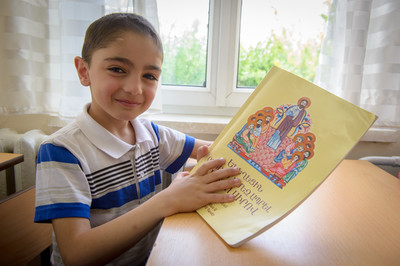
The road to recovery has not been easy. Whatever frail faith survived through seven decades of communism was passed down from parents to children — without the support of Bibles, teaching materials, or a priest’s guidance. As highly educated priests emerged from seminary and church doors reopened in the 1990s, one thing was still lacking: teaching materials for children.
World Vision supplied churches with Bibles and worked with Gospel Light Publishing to develop Christ to the Children, an age-appropriate series of creative Christian education materials geared for children ages 6 through 16.
“These books gave us the chance to have strong Sunday schools,” Father Nshan says. “Now the children themselves ask for more. Even in summer and on holidays they want to be learning more about living out their faith.”
The Apostolic church uses Christ to the Children not only in 130 Sunday schools but also in some public classrooms. Each year, approximately 150 Sunday school teachers across Armenia participate in World Vision’s Sunday school training, learning new ways to support faith among the younger generation. Because teaching Christian faith in public schools is legal in Armenia, more and more public schools also are using Christ to the Children in the classroom.
Now as they learn, they also are excited to share what they’re learning with their parents.—Karine Hartutunyan
Meanwhile, children flock to World Vision’s popular summer camps that build faith and provide strong Christian role models for the children — priests and young, Christian mentors like Misha Poghosyan.
“For 70 years, Armenian children had no Christian education,” says Karine Harutunyan, a World Vision faith and development adviser. “Now as they learn, they also are excited to share what they’re learning with their parents.”
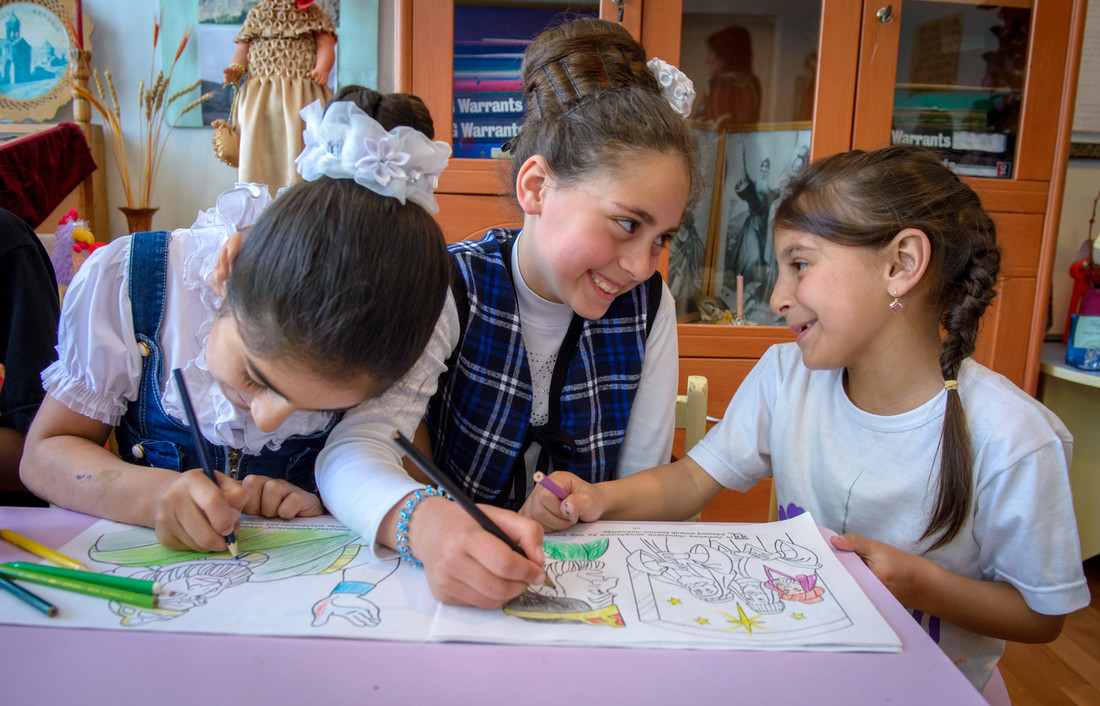
Standing on a rock of faith
With Christian education and activities blossoming across Armenia, one priest predicts this is the beginning of a “renaissance” for the Apostolic church. Priests encourage parents and children alike to gather not just on Sundays but throughout the week to support one another, celebrate life, and grow in faith.
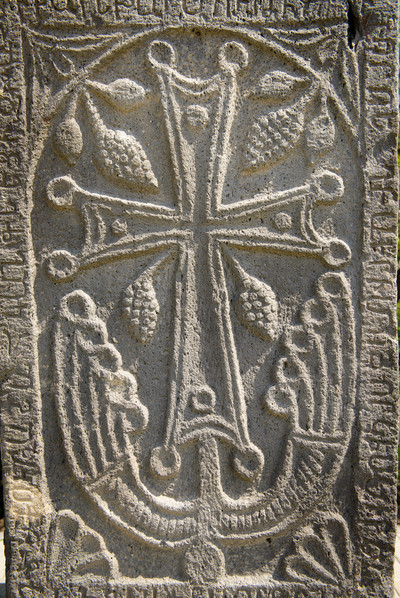
In 1991, an estimated one Armenian in 100 could say the Lord’s Prayer. “But now,” says the Very Reverend Father Aris Tonoyan of the celebrated Khor Virap Monastery, “the church is shaking with the sound of children saying the Lord’s Prayer. We are moving forward with great intention.”
The ancient Armenian symbol of Christianity is a cross that sprouts leaves, a poignant reminder of the flourishing life that comes for those with the confidence that God is with them. The faithful know that when they turn to the budding cross, they will always have hope.
That cross sustains Menua as he faces potential blindness, Father Paren as he serves tirelessly in vulnerable communities, and Gor as he leads youth in the seemingly impossible effort of providing families with decent homes.
And the Rock they stand on isn’t the unyielding stone native to Armenia but the firm foundation of Scripture: “Trust in the Lord forever, for the Lord, the Lord himself, is the Rock eternal” (Isaiah 26:4).
